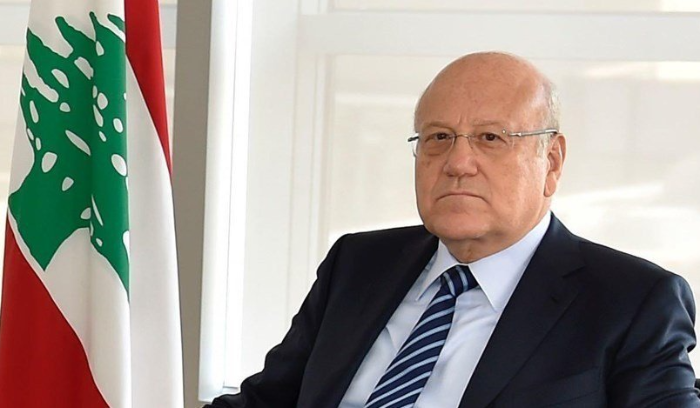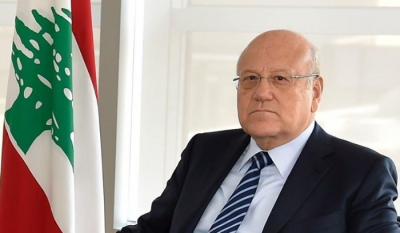The newspaper "Nidaa Al-Watan" reported: In clear terms, and with a transparency that borders on "naivety and lack of experience," Deputy Prime Minister Saadeh Al-Shami shocked public opinion with his abrupt announcement of "the bankruptcy of the state and the central bank." His statement took on significant ramifications, both internally and externally, given that it came from a "senior government official," as major global news agencies reported. It had a seismic impact on the Lebanese collapse, worsening an already dire situation and deepening the cracks in the decaying pillars of the state.
There is no doubt that Al-Shami intended to speak in good faith, aiming for candidness and the need to move away from the square of official "denial." However, his mistake was that his words were ill-timed and out of place, appearing as a "slip-up" that "tricked" his government and confused its president on the verge of finalizing a draft preliminary agreement with the International Monetary Fund. This led to a series of official positions aimed at "patching up his slip of the tongue," which contained contradictory meanings based on the premise: "Are we bankrupt or not?" Financial sources commented on the attempts to distinguish "bankruptcy" between state liquidity and solvency, confirming that these are "just phrases used by officials to outsmart the people. Everyone knows that the state has been bankrupt and has 'suffered from bankruptcy' since 2019, subsisting on the remaining deposits of the Lebanese since then."
Prime Minister Najib Mikati quickly moved to quell the chaos caused by his deputy's statement, affirming that "what was taken from Al-Shami's speech was out of context, and what he meant was liquidity, not solvency." The Governor of the Central Bank, Riad Salameh, also denied "the bankruptcy of the bank," emphasizing that it "is still performing its role as assigned under Article 70 of the Monetary and Credit Law and will continue to do so."
Al-Shami himself sought to clarify what he meant in his statement to "Nidaa Al-Watan," explaining that what was quoted from him came in response to a question about the state's and the Central Bank's contribution to closing the financial gap, stating that "the state and the central bank have a difficult situation and do not have enough liquidity." He added: "By technical meaning, I meant cash flow difficulty (Broke), not bankruptcy (Bankrupt).”
Former Minister Richard Kiyoumyan commented to "Nidaa Al-Watan" that Al-Shami "is saying the truth and nothing but the truth, and he is honest with himself and with the people. The state is bankrupt and requires a revival." He emphasized the need to confront the Lebanese with the truth, enact a capital control law, and establish an economic rescue plan while reconstituting the authority through independent and technocrat figures that inspire confidence in investors and implement reforms; otherwise, there is no salvation for Lebanon.
Economic expert Louis Habaqah insisted to "Nidaa Al-Watan" that "the only bankrupt entity in the country is the citizen whom they want to rob of his money and deposits, while the state remains wealthy with its properties and institutions but suffers from a liquidity problem in its treasury. Moreover, the central bank has properties, assets, and numerous branches, and together with the state, it can find many ways to bridge the financial losses without burdening the citizens with any costs and losses."
On the banking front, yesterday, "Bank of the Mediterranean," "Bank of Audah," and "Bank of Beirut" filed lawsuits against the state before the General Assembly of the Court of Cassation against Judge Ghada Aoun, accusing her of committing "serious errors" in the investigations she is conducting into the banking sector. Additionally, the head of the Banking Association, Salim Safi, filed a petition to "recuse" Judge Aoun from this file before the Civil Court of Appeal in Mount Lebanon. However, Aoun refused to acknowledge the petition to evade what would result from her being informed, which is to "immediately withdraw her hand" from the investigations until the two lawsuits are resolved.
On the government front, Prime Minister Mikati visited Clemenceau yesterday, where he was received by the head of the "Progressive Socialist Party," Walid Jumblatt, and discussed the current issues, particularly the election matter, especially since Mikati included on his supported list in Tripoli the "Socialist" candidate Afra Eid. Upon leaving, it was noticeable that the Prime Minister deliberately emphasized that he intends to "brake" government appointments in the foreseeable future, stating: "There will be no appointments at present." When asked if his remarks indicated that he preferred to postpone the approval of the new appointment package to "the next term," he simply responded: "No appointments in the cabinet meeting next Wednesday."




